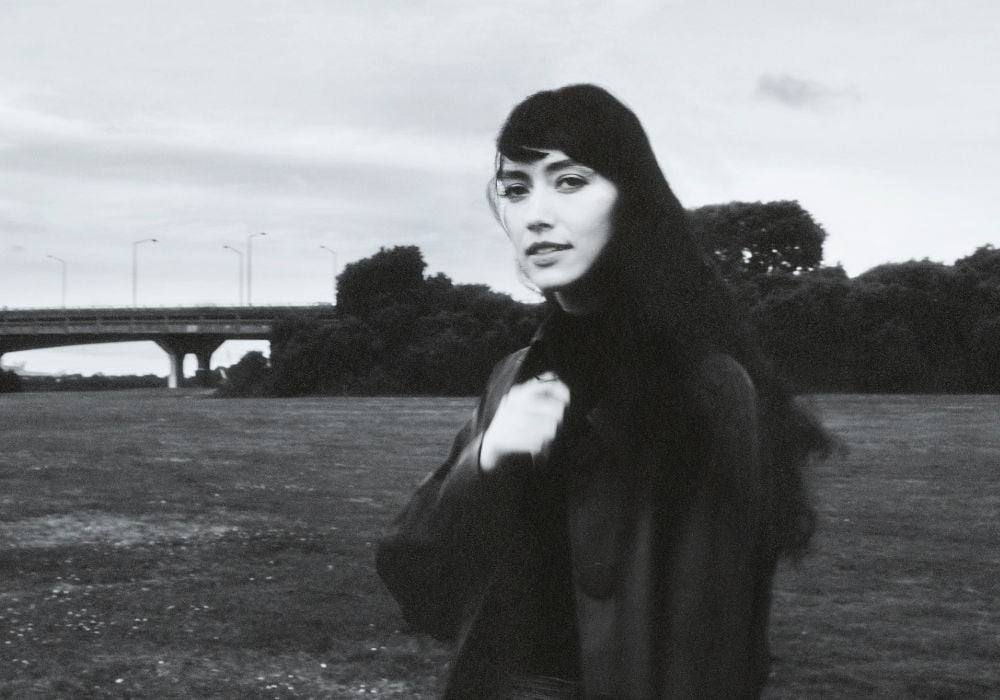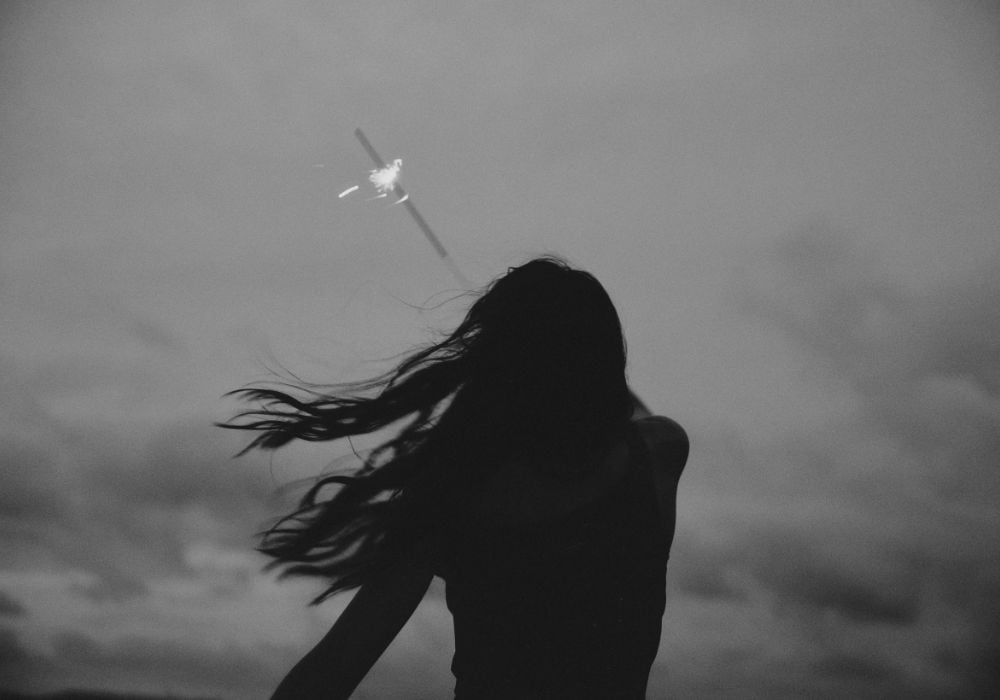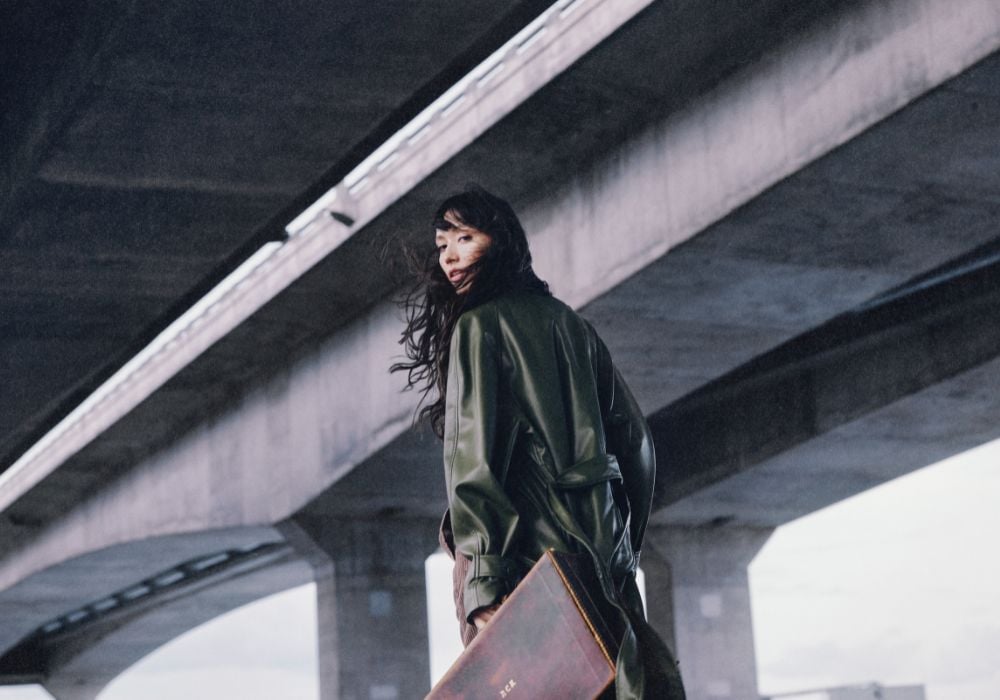Frances Carter
Fazerdaze, On Her Own Terms
Fazerdaze became a breakout global success in 2017. Then she disappeared. Now, she's finally ready to tell the world where she's been.
1. Fazerdaze’s Past
“The history of men’s opposition to women’s emancipation is more interesting perhaps than the story of that emancipation itself.” — Virginia Woolf, A Room of One’s Own, 1929.
Amelia Murray has a story to tell. She’s had this story to tell for a long time, although she’s been hesitant to do so. “It’s been really hard not being able to tell the fans why things have been slow for the last eight years,” she says.
In 2017, Amelia’s Fazerdaze project was at its peak. Her debut album, Morningside, was a major release in the blossoming bedroom-pop scene, the lush melancholy of tracks like “Lucky Girl” and “Jennifer” landing on tastemaker playlists, earning millions of streams in the process. Fazerdaze became a popular festival booking, taking Amelia from the Auckland neighbourhood — whose name she borrowed for her debut — to the rest of the world.
And then, seemingly overnight, Fazerdaze disappeared. Fans were left to wonder where one of their favourite artists had gone; there was no revelatory social media post, no informative press statement. If this was to be the end of Fazerdaze, the woman behind the name didn’t seem ready or able to explain why.
“I felt really undeserving of it. I felt like a total fraud,” Amelia admits now of the success of Morningside, seven years after its release changed her life. “I definitely had deep feelings of unworthiness.”
Amelia was just 24 when Morningside came out and didn’t feel equipped to deal with the pressure of growing fame. “I felt I was running out of time, that I was only going to be relevant if I was young, that my success was only because I was young. I was also told that my success was only because I was a woman, a girl.”
Love Music?
Get your daily dose of everything happening in Australian/New Zealand music and globally.
In this first part of her career, Amelia wasn’t alone.
She was in a serious relationship with a not-insignificant New Zealand musician, whose band’s most famous song still regularly soundtracks TV adverts. The pair lived and created together in her partner’s Auckland home, where she was afforded the spare room to use as a studio.
She was a fledgling singer-songwriter; they were the songwriter in a Platinum-selling rock band. She grew up listening to their music, and they recognised her intense musical promise. It was an unconventional relationship and for a while it seemed to work, back when Amelia was still finding herself as Fazerdaze. “The first half of our relationship, for the most part, was really good. I was young, eager to learn, and they had so much knowledge to share about music and songwriting.”
“You can be both soft and powerful. You don’t have to be one thing.”

Credit: Frances Carter
She had admired their music so much in her youth, however, that Amelia found it difficult to “tear away from the dynamic of seeking their approval.”
The power dynamic between the famous musician and the emerging one, the descending star and the ascending one, was colossal enough to navigate, but there was a more problematic dynamic dominating the relationship: they were 20 years older than Amelia, having met her when she was just 19.
“I lived in their house and they taught me so much,” Amelia says, looking back. “While I was lucky to have a studio there, my sense of self was eroding, I just didn’t realise it. I was disappearing, and it was hard to explain to myself, my family, or the fans where I had gone.”
Even more consequential, there was pressure to start a family, even as the Fazerdaze project was on an increasingly upward trajectory. Guilt seeped into Amelia, affecting her focus.
“After the success of Morningside, I felt like I owed someone a family. When I talked about going on tour again the question was, ‘But when are we going to start a family?’ I just wasn’t ready, but that just didn’t feel like a valid enough reason. There was so much pressure on me to birth a child I did not feel ready for.”
It’s all too often the case with such troublesome domestic relationships: one doesn’t become fully aware of what they were suffering through until the aftermath. “It was a slow, invisible process of feeling trapped within a power dynamic. The relationship was fundamentally so out of balance but I couldn’t see what was happening to me.”
Most of the lyrics on Morningside, back then, seemed to be about the uncertainty and anxiety of navigating early adulthood. But knowing what we know now, deeper, more personal meanings can be heard. “I could never leave you if you let me try / Go on and let me try,” Amelia’s voice pleads in “Little Uneasy”. In the turbulent story of “Misread”, whose narrator flits between idealising a romantic partner and despairing at their behaviour, she scolds, “I hate the way you talk about me to your friends / They tell me everything; you may as well talk to my face.”
The relationship ended in 2021, between COVID lockdowns, but Amelia was scared “because I didn’t know where to go.” A helpful friend set her up with an empty apartment in the city, where she relished having “my own space to think.”
“I had so much elation [that I] had my own space and nobody controlling it,” she adds. She also felt able to make music again, releasing Break! in 2022, an EP born out of sheer relief. (Break! was nominated for Best Record at the 2023 Rolling Stone Aotearoa Awards.) “I’m just so happy that it took all the pressure off,” she says of the intermediary record, which let fans know that she wasn’t gone for good.
“It’s so triumphant to me that I’m still here. I’m still doing what I love. I feel so happy to be on the other side of it now. I feel like I’ve got this new lease of life.”

Credit: Frances Carter
Her intertwinement with her former partner, though, wasn’t over.
The pervading sense that Amelia faced throughout their relationship — that they owned her — was solidified when the bulk of her catalogue, including her upcoming release, was placed on hold. Almost everything that was written during their relationship became disputed, impeding Amelia when she was finally feeling like Fazerdaze again.
Amelia had sadness for herself, but she also had profound sadness at the loss of her community. “I’ve just been so pent up for so long. I haven’t been able to update them or tell them what I’ve been going through and why it’s been so slow.”
It was art, she says, that really saved her during this time. She remembers being overwhelmed by the Norwegian film The Worst Person in the World, which depicts a messy power dynamic between an uncertain 20-something woman and her older boyfriend, who also happens to be a famous artist. Taylor Swift’s “All Too Well” short film also struck a chord. “I’ve never felt so seen [in] art before,” she says.
Today, Amelia darts between anger and relief, sadness and joy; all four emotions are, she’s beginning to realise, equally valid. “I think the thing I’m really working through is allowing myself to move forward [while] having a lot of anger of what I went through in that relationship. I just really want to share the story because I didn’t know about power dynamics and age gap relationships when I was in my twenties.” (When approached for comment, Amelia’s ex said, “I disagree with her portrayal of our relationship. It looks like a PR story Amelia feels is necessary to promote the album we made together. I don’t want to criticise or bring our private life any further into the public sphere. I wish only to move on and have no further comment.”)
2. Fazerdaze’s Future
“A woman must have money and a room if she is to write fiction.” — Virginia Woolf, A Room of One’s Own, 1929.
Amelia has a new story to tell. It’s a better story, and it’s still being written. “It’s been really amazing. I just feel a lot lighter and I just feel really happy.”
After all the painful waiting, all the misspent years and waylaid plans, the second Fazerdaze album is just a few weeks away from release. It’s called, tellingly, Soft Power, a declaration of intent more so than an album title.
Now aged 31, the arrival of Amelia’s album signals a new decade, a new beginning, one not scarred by the mistakes of the past but informed by their lessons.
She’s now very settled in Christchurch, where she moved to a few years ago for a completely fresh start. She had no friends down there or concrete plans in place at first, but she’s found a safe community in the
Canterbury city.
“I live with really great flatmates and have some really uncomplicated friends. It’s just very chill down here. I would recommend it, but I think some people would find it boring. I quite like that. It’s quite a change of pace.”
It’s in Christchurch that her Fazerdaze project has really returned to life, too. Most of Soft Power — around 8-11 songs — were written before moving south, but she finalised them in her new home.
“[Soft Power] was definitely the light at the end of the tunnel,” Amelia says, smiling. “If I didn’t have this record, I don’t know what I would have clung onto through what I was going through. But at the same time, I think I was gripping onto the record so tight that I wasn’t allowing myself to be agile.”
Soft Power is a DIY album in every way, even though Amelia avoided making it herself for the longest time. “I always knew I had to produce this record myself, but I was running from the workload of that. I just wanted someone else to save me,” she concedes. “I just didn’t trust myself. I went through a really long period of trying to find someone else that believed in me and believed in the record enough to work on it, and I could never find that person.”
Searching for this help, she undertook a trio of trips to Los Angeles, working with different producers, but the right chemistry never arrived. “The last time I went to LA to work on this [album], I just had a really disheartening experience. I just didn’t feel seen and I didn’t feel successful enough.” Instead, she returned to New Zealand, broke and disillusioned. “I wish I’d spent that money on my own gear,” she admits now. “I still don’t even have nice gear!”
Although it was a humbling experience, that final trip to LA reinvigorated Amelia. “It reminded me how much I believed in myself. I was like, ‘How can you guys not believe it?’”
Realising her second album wasn’t going to sound “as high quality” or as “slick and polished” as she’d hoped, Amelia hunkered down in Christchurch, working diligently on the songs. “Every morning, I’d wake up and comp vocals before I’d even had breakfast or anything. I just did that until the record was finished.”
Something immediately strikes you upon listening to Soft Power: these songs sound nothing like Morningside. Much of it is remarkably electronic-leaning, and the atmospherics are heavier and more expansive.
Amelia was ready to leave bedroom-pop behind after the release of Morningside, and she’s only grown further from the claustrophobic genre over the years. That’s why she refers to her new album as her “bedroom stadium record.”
She started listening to stadium-ready bands like The War on Drugs and Tame Impala, “feeling more connected to something bigger than myself.”
“I was really just feeling tiny and just wanting to take up more space, and this was an outlet for that,” she says. “I think because I felt so tiny in the relationship that my way of dealing with that [was] just trying to make the biggest-sounding music I could. I guess I just dreamed of not feeling small.”

Credit: Frances Carter
Tame Impala’s Lonerism was a formative album for Amelia at university, and it stayed with her over the years, guiding her vision for Soft Power. “It was quite an indie, gritty, and distorted record but it crossed over to the mainstream. I think that’s what I was trying to strike [on Soft Power] — that balance of being both accessible and alternative indie.”
Soft Power is for her fans, but it’s also for the Amelia of the past, present, and future. This is the album, she says, that she would have wanted her teenage self to discover. “I feel like Soft Power is me trying to make the record for myself back in my uni days. I feel like I was trying to make the equivalent record to how I felt about Lonerism when I heard that.”
Soft Power presents Amelia at her most vulnerable as Fazerdaze. “A Thousand Years” is the most direct lyrical allusion to the relationship that defined her twenties, (she had previously played with writing about this time in her life on the tentative “Flood Into”, a bonus track on Break!), which crystallises the ache of realising so much of your life has passed by before you even realised. “I watch the world go by, and / Days start to multiply, and / Months start to disappear, I / Fold into a thousand years,” she sighs under sombre synths. In a jagged spoken word verse, she bemoans having to “play to the crowd till I disappear” because “there’s no way out of here.”
Everything about this new era of Fazerdaze seems healthier. Amelia is releasing Soft Power on her own label, Buttrfly Records, an empowering moment for her following many bruising battles with the music industry. She’s helping the next generation too, by offering mentorship at a local music academy. (“I’m definitely doing my best to encourage them to trust their instincts.”) She has a North American tour coming up with Pond, one of the only positives to come out of those LA trips.
She’s looking forward to her thirties with ambitious targets, and rightfully so. She envisions playing a big festival slot (“at sunset,” she hastens to add), and she wants to take Fazerdaze to bigger and better stages. “I guess I have to stay unattached to the outcome, [but] that would be amazing if we got to play arenas and things like that.”
What does she want fans to get out of Soft Power? “To know you can have contradictions,” Amelia replies. “You can be both soft and powerful. You don’t have to be one thing. I don’t have to be little, and I also don’t have to be aggressive. I can find this middle ground of being powerful but retaining all my kindness and empathy.
“The whole journey I’ve been through is really learning to get quiet and trust yourself because the noise of the world is so loud…”
Over the phone from Christchurch, Amelia’s voice fades away mid-sentence. Her former relationship is flickering through her mind again. “I don’t want to use my platform to just vent. I’m really weary of coming across downtrodden and bitter…” She pauses again. It’s a silence that you instinctively know doesn’t need to be filled. “I just want to move forward with my life. I’ve read Virginia Woolf and been reading about women artists through history and how they had to go against the grain. It’s so triumphant to me that I’m still here. I’m still doing what I love. I feel so happy to be on the other side of it now. I feel like I’ve got this new lease of life.”
This Fazerdaze interview features in the December 2024-February 2025 issue of Rolling Stone AU/NZ, which is on newsstands now.
Whether you’re a fan of music, you’re a supporter of the local music scene, or you enjoy the thrill of print and longform journalism, then Rolling Stone AU/NZ is exactly what you need. Click the link below for more information regarding a magazine subscription.
Visit the Rolling Stone Musicians on Musicians microsite here.



































